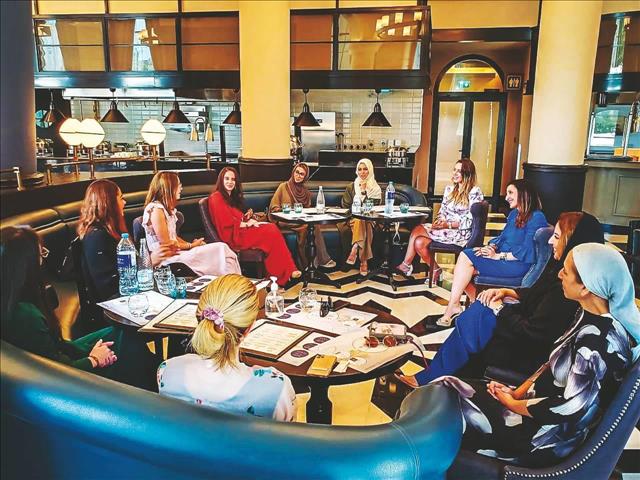
UAE- Building the bridges to Gulf women's hearts
(MENAFN- Khaleej Times) The Gulf-Israel Women's Forum is an idea whose time had come. The online platform, which predates the signing of the momentous Abraham Accords on September 15, is the brainchild of Justine Zwerling and Fleur Hassan-Nahoum, who have been friends for almost 30 years.
In retrospect, Fleur says she knew in 'their bones that this was our part to play in the regional peace story. 'We have been there and done that, she says. 'We saw the tangible benefits and wanted to replicate our previous successes to make the Middle East a better place for our sons and daughters.
Justine has carved a niche for herself as the head of primary markets for the London Stock Exchange (LSE) and is also the founder of the Jewish Women's Business Network. She was also named as one of the 100 most influential women in finance and diversity in 2020.
Fleur wears many hats. She is the deputy mayor of Jerusalem and holds the foreign affairs portfolio. She also co-founded the UAE-Israel Business Council with Israeli entrepreneur Dorian Barak.
The Forum, which has hundreds of members, is an offshoot of the Council. Its germinal thought, as Justine puts is, is premised on 'who you are, 'what you do and 'how I can help you.
'Fleur and I realised that we are living our life's dream to reunite as women and family, says Justine. 'We knew that the Forum was one of the critical steps while building the Council, as both are inextricably linked. Justine says the key was playing to the instinctive strength of women who are 'natural networkers, nurturers, multitaskers and gamechangers.
Fleur remembers coming across a research paper that had cited women create 10 per cent more value than men for their businesses through networking. 'The study made a lot of sense to me, she says. 'I believe that women are strong connectors, as we not only converse more, but also listen more.
She believes women can be natural peacemakers in the Arabian Gulf. And what better place than the UAE and Bahrain, who are signatories to the historic Abraham Accords. 'We want to make this a Gulf-wide initiative, as we understand other countries may come on board of the Abraham Accords and our network should evolve into a regional grouping, adds Fleur.
As Jewish women who have successfully built impactful women's communities, Justine says, 'We knew that we have so much to learn from our Emirati and Gulf sisters. Bringing us together in organic small forums was the first key to beginning our new future, together.
The Forum, Justine points out, would unite women from the Gulf and Israel in friendship, culture and business. 'We are all daughters and mothers of the Middle East. We have created a place for friendships, businesses and culture to flourish, she says.
What started as a small online forum grew organically and several virtual meet-ups and socially distanced in-person meetings were held in Dubai and Israel amid the pandemic. 'Fleur and I hosted 10 online forums last year on diverse topics, such as women in media, Israeli and Emirati cultures, and a challah-baking session with our Emirati sisters who were curious to learn to bake traditional Jewish bread (used during sabbath), remembers Justine.
More events are in the pipeline this year involving women from Israel and the Arab world focusing on technology, finance, healthcare, media and other sectors. 'As a representative of Jerusalem, I'm more excited at the potential for my city as a tourist and technological hub, points out Fleur. 'For the uninitiated, Jerusalem has almost 40 per cent Arab population. It's important to involve East Jerusalem Arabs in the Israel-Gulf normalisation process because they will benefit tremendously from this in several ways. East Jerusalem can be a natural bridge between Israel and the Gulf because of shared language and culture.
Fleur envisions East Jerusalem as the 'back office of the Middle East. 'Plans are afoot in bringing Fortune 500 companies to open their research and development operations for the Middle East in East Jerusalem, which will offer financial incentives and opportunities for the Arab-speaking workforce, she says.
Similar enthusiasm about the Forum is also exuded by Ariella Steinreich, senior vice-president of Steinreich Communications, who — along with her team — has been taking the lead on helping Israeli and Gulf companies communicate with their new friends and explore business opportunities in each other's markets. 'What makes the Abraham Accords different from past peace deals is that this time around, the people in all three countries were incredibly supportive. They've taken to social media to share their excitement and to meet people in the other country, she says.
Steinreich cites the overwhelming response to a virtual Women in Media event that the Forum had organised in November where women journalists from three countries addressed participants about their experience of covering the accords and their hopes for the region.
'Journalists played an integral role in the historic Abraham Accords, they helped educate the public on the positive impact this would have on the economic and social levels, she says. 'This event allowed participants to hear directly from some of the journalists who were at the fore.
Justine, Fleur and Ariella are bound by a common goal — to act as a bridge between Israeli and Arabian Gulf women. They are successful career women, who want to radiate peace and prosperity among women in the region.

Legal Disclaimer:
MENAFN provides the
information “as is” without warranty of any kind. We do not accept
any responsibility or liability for the accuracy, content, images,
videos, licenses, completeness, legality, or reliability of the information
contained in this article. If you have any complaints or copyright
issues related to this article, kindly contact the provider above.
















Comments
No comment